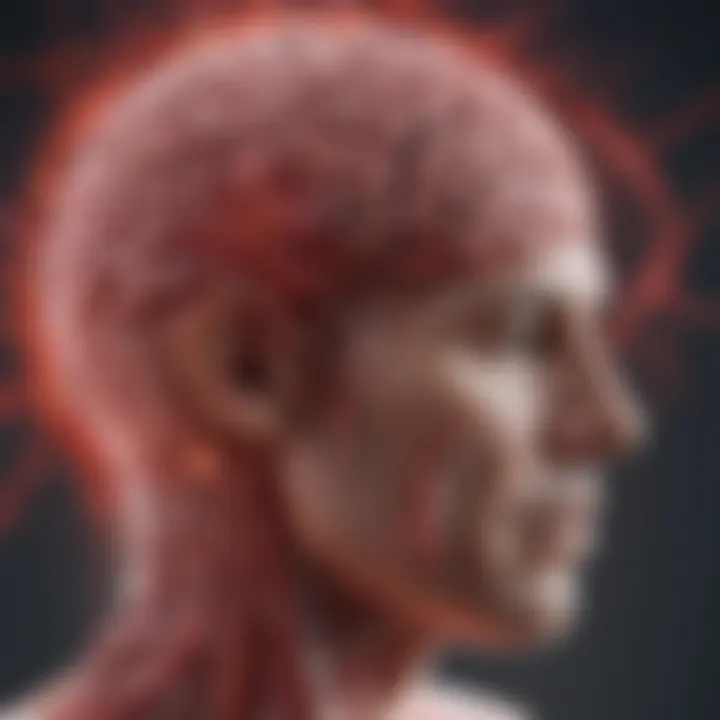Understanding High Blood Pressure's Role in Dementia


Intro
The relationships between various health conditions have long been a subject of study, especially as populations age. Among these, high blood pressure and dementia present critical intersections that warrant careful examination. Understanding these connections is vital, not only for individuals experiencing these health challenges but also for caregivers and healthcare professionals engaged in their management. As both conditions become increasingly common, effective strategies for prevention and intervention become paramount.
In this narrative, we delve into the intricate interplay between hypertension and cognitive decline. We explore how elevated blood pressure can impact mental faculties, the underlying physiological mechanisms at work, and the role that age and lifestyle factors play. By synthesizing contemporary research, we aim to shed light on potential avenues for enhancing cognitive health through the management of blood pressure.
Prolusion to High Blood Pressure and Dementia
The relationship between high blood pressure and dementia is an area of growing research interest. This topic holds significance for both health professionals and the general public because it touches on two major health concerns facing aging populations today. High blood pressure, or hypertension, is a condition that many individuals experience, especially as they grow older. On the other hand, dementia presents its own set of challenges, affecting cognition and daily functioning.
Understanding this intersection is essential because hypertension can influence cognitive health. Managing blood pressure might not only improve physical health but also reduce the risk of developing dementia. Therefore, exploring how these two conditions interact offers crucial insights into preventive health strategies. Well-informed approaches can potentially slow, halt, or even reverse cognitive decline associated with high blood pressure.
Defining High Blood Pressure
High blood pressure is a common medical condition characterized by the force of blood against the walls of arteries being consistently too high. This can lead to various health issues, including heart disease and stroke. Typically, blood pressure readings consist of two numbers — systolic and diastolic. The systolic number measures pressure when the heart beats, while the diastolic number measures pressure when the heart is at rest. According to the American Heart Association, normal blood pressure is considered to be 120/80 mmHg. Anything above that may be classified as elevated, stage 1 hypertension, or stage 2 hypertension.
Understanding Dementia
Dementia is an umbrella term that encompasses a variety of symptoms associated with a decline in memory, reasoning, or other cognitive abilities. This condition is often progressive, meaning that symptoms may worsen over time. Alzheimer's disease is one of the most well-known types, but there are others, such as vascular dementia and Lewy body dementia.
Dementia impacts not only the individual but also their families and caregivers. It can lead to significant changes in personality, behavior, and functional ability. Because of its multifaceted nature, understanding the various types and their underlying causes is vital in addressing the disease effectively.
The Scope of the Problem
The prevalence of high blood pressure and dementia is a significant public health concern. According to the World Health Organization, hypertension affects over 1.13 billion people worldwide. It is one of the leading risk factors for various diseases, including those that affect cognitive functioning, such as dementia. In addition, with aging populations globally, the incidence of dementia is projected to rise substantially.
Given the interconnected nature of these health issues, the risk of dementia could increase as the population ages and the prevalence of hypertension remains high. Addressing high blood pressure may thus emerge as a key strategy in the fight against dementia. Health systems must prioritize education, prevention, and treatment, emphasizing regular screening and lifestyle choices that can maintain healthy blood pressure levels.
Physiological Mechanisms Linking Hypertension and Dementia
Understanding the physiological mechanisms linking high blood pressure and dementia is crucial for grasping how these two health issues intertwine. High blood pressure, or hypertension, is not merely a cardiovascular concern; it plays an instrumental role in brain health and cognitive function. This section will explore various pathways through which elevated blood pressure can contribute to dementia, thus enhancing our understanding of the preventive opportunities available.
Impact of High Blood Pressure on the Brain
High blood pressure can have deleterious effects on the brain in various ways. One primary concern is the impact of prolonged hypertension on blood vessels. Over time, excessive pressure can damage the arterial walls, leading to a condition known as vascular stiffness. When blood vessels become stiff, their ability to supply adequate blood flow to the brain diminishes. This causes a reduced supply of oxygen and nutrients, impairing neuronal function.
Studies have shown that hypertension can lead to structural changes in the brain, such as the presence of white matter lesions. These lesions are indicative of small vessel disease, which is linked with increased risk of cognitive decline. Moreover, chronic high blood pressure can lead to strokes, a significant risk factor for vascular dementia. In summary, the impact of high blood pressure on the brain is multifaceted, with both direct and indirect consequences for cognitive health.
Vascular Contributions to Cognitive Impairment
The vascular system is integral to maintaining brain health. Dysfunction in this system can significantly contribute to cognitive impairment. In individuals with high blood pressure, the incessant pressure can lead to atherosclerosis, which is the buildup of plaque in arteries. This can restrict blood flow and, consequently, oxygen supply to brain regions responsible for cognition.
Moreover, conditions such as chronic ischemia can develop due to vascular impairment. This situation occurs when certain brain areas do not receive sufficient blood, leading to gradual neuronal death. Research links these vascular changes to various forms of dementia, emphasizing the importance of understanding how vascular health correlates with cognitive function. The interplay among vascular health, hypertension, and cognitive impairment highlights an urgent need for intervention.


Neuroinflammation and Neurodegeneration
Neuroinflammation is emerging as a crucial element in the dialogue between high blood pressure and dementia. Increased blood pressure can lead to systemic inflammation, which spills into the central nervous system, promoting neuroinflammation. This condition can result in the activation of glial cells and the release of pro-inflammatory cytokines. Such an environment becomes toxic for neurons and alters synaptic functioning.
Furthermore, neuroinflammation can facilitate neurodegenerative processes. For instance, research indicates that inflammation may expedite the accumulation of beta-amyloid plaques associated with Alzheimer's disease. The relationship between hypertension-induced inflammation and neurodegeneration is complex but suggests a direct pathway through which high blood pressure can elevate the risk of dementia.
In essence, understanding these physiological mechanisms reveals how hypertension does not just affect the heart and vessels but also plays a critical role in cognitive decline, emphasizing the need for effective management strategies.
By delving into the intricate interconnections of these physiological mechanisms, we gain valuable insight that underpins both preventive and therapeutic approaches to managing high blood pressure and mitigating its cognitive implications.
Risk Factors for High Blood Pressure and Dementia
Understanding the risk factors for high blood pressure and dementia is crucial in order to develop effective preventive measures. Both conditions are significant contributors to the deterioration of cognitive health in aging populations. Identifying the determinants allows for targeted interventions that can potentially mitigate risks associated with each condition.
High blood pressure, or hypertension, can lead to various complications, including increased likelihood of cognitive decline and dementia. By recognizing the interrelation of these risk factors, clinicians and researchers can create strategies tailored to the individuals most at risk.
Age and Gender Considerations
Age is a predominant risk factor in the development of both high blood pressure and dementia. As individuals grow older, the elasticity of blood vessels reduces, often leading to elevated blood pressure levels. Furthermore, cognitive decline typically accelerates in the elderly. Statistically, the incidence of dementia significantly increases among those aged 65 and over.
Gender also plays a pivotal role. Men tend to develop high blood pressure at a younger age compared to women. However, after menopause, women's blood pressure tends to increase more dramatically. This shift can lead to a higher risk for women to develop dementia later in life. It is essential to consider age and gender differences in research and healthcare strategies to account for these dynamics effectively.
Genetic Predispositions
Genetics is another crucial element that contributes to both high blood pressure and dementia. Family history can indicate a predisposition to both conditions, making it important to study genetic markers and their influence. Some specific genes are associated with hypertension and cognitive decline. For instance, variations in the APOE gene have been linked to increased risk for Alzheimer's disease. Understanding these genetic factors can help in personalizing treatment plans and in assessing risk at an earlier stage.
Lifestyle and Environmental Factors
Lifestyle and environmental influences play a significant role in the health of an individual. Poor dietary choices, physical inactivity, and high levels of stress are linked to the development of hypertension. Similarly, these factors can also contribute to cognitive decline.
Environmentally, socioeconomic status can affect access to healthcare, nutrition, and exercise opportunities. Communities with limited resources often face higher rates of hypertension and cognitive impairment. Moreover, chronic conditions such as diabetes can coexist with hypertension, further elevating the risk for dementia.
To summarize, a comprehensive approach to understanding the risk factors for high blood pressure and dementia involves recognizing the interplay of age, gender, genetics, and lifestyle. This information is essential for guiding future research and public health initiatives aimed at reducing the prevalence and impact of these interrelated health issues.
"Preventive measures targeting these risk factors can potentially reduce the burden of both hypertension and dementia in our society."
Epidemiological Evidence of the Connection
Understanding the epidemiological evidence linking high blood pressure to dementia is crucial for recognizing the public health implications of these intertwined conditions. Epidemiology allows us to systematically study the patterns, causes, and effects of health and disease conditions in populations. By examining prevalence studies, longitudinal research, and global perspectives, we can appreciate how high blood pressure not only serves as a critical risk factor for dementia but also affects broader health trends.
Prevalence Studies
Prevalence studies offer valuable insights into the relationship between high blood pressure and dementia. They help quantify the number of individuals affected by both conditions in specific populations. Research consistently shows a higher prevalence of cognitive impairment among individuals with hypertension. For instance, a study published in The Lancet Neurology found that older adults with high blood pressure had a significantly increased risk of developing dementia compared to those with normal levels.
Factors influencing these prevalence rates include age, gender, and ethnicity, demonstrating that the effects of hypertension on cognitive decline manifest differently across demographics. This variance in prevalence highlights the need for targeted public health strategies that consider these specific factors. A clear understanding of how many individuals are affected can inform healthcare policy and resource allocation, ensuring that those at highest risk receive appropriate screening and intervention.


Longitudinal Research Insights
Longitudinal research provides a further understanding of how high blood pressure impacts the risk of dementia over time. Such studies follow participants through several years, offering insights into causal relationships and the progression of cognitive decline. Many studies indicate that elevated blood pressure in midlife significantly correlates with later dementia diagnoses. For instance, findings from the Framingham Heart Study have shown that the risk of dementia doubles for individuals with hypertension compared to their normotensive counterparts as they age.
Through longitudinal studies, researchers have been able to identify the critical windows for intervention when managing blood pressure could potentially delay or prevent cognitive decline. By continuously monitoring the same population, scientists can account for confounding variables, making these insights particularly valuable in shaping future treatment protocols.
Global Health Perspectives
Examining global health perspectives sheds light on the burden of high blood pressure and dementia at a population level. The World Health Organization reports that hypertension affects nearly one in four adults worldwide, and its increasing incidence points to a rising public health crisis. This crisis resonates deeply with the rising dementia prevalence, creating a dual challenge for healthcare systems.
Across different countries, variations in lifestyle, diet, and healthcare access influence the intersection of hypertension and dementia. For example, regions with traditional high-sodium diets often report higher rates of hypertension, which correlates with increased dementia cases. Moreover, varying public health policies also affect access to preventive care and treatment, influencing the overall impact of these conditions.
Understanding these global trends enables public health officials and policymakers to devise strategies that not only address high blood pressure but also target its correlation with dementia. International collaborations and research initiatives can help in developing evidence-based practices that are culturally sensitive and accommodating to the needs of diverse populations.
The Role of Blood Pressure Management
Managing blood pressure is a critical component in understanding the connections between high blood pressure and dementia. Given that hypertension is often referred to as the "silent killer," its implications extend beyond mere cardiovascular issues, particularly as it relates to cognitive health. This section discusses the imperative nature of effective blood pressure management, emphasizing specific elements, benefits, and considerations.
Monitoring Blood Pressure Effectively
Regular monitoring of blood pressure is essential for individuals at risk for hypertension-related complications. Home blood pressure monitors are beneficial tools that allow individuals to track their readings consistently. It is important to record blood pressure at different times of the day and during various activities, as levels can fluctuate. Keeping a log of these measurements can assist healthcare providers in developing tailored management plans.
Furthermore, strategies such as using automatic or digital blood pressure monitors enhance usability and accuracy. Patients should be educated about the correct technique for taking readings. Improper usage can lead to inaccurate results, which may misguide management strategies.
Pharmacological Interventions
Pharmacological interventions play a significant role in managing high blood pressure, especially for those diagnosed with hypertension. Antihypertensive medications such as lisinopril, amlodipine, or losartan are commonly prescribed to lower blood pressure. These medications work through various mechanisms, such as reducing the heart rate or relaxing blood vessels.
The choice of medication depends on individual health profiles and existing conditions. It is crucial for patients to follow their prescribed regimens, as inconsistent adherence can lead to adverse effects on both blood pressure and cognitive health. Regular follow-up appointments with healthcare providers are necessary to evaluate the effectiveness of the medications and make adjustments if needed.
Lifestyle Modifications and Their Impact
Adopting lifestyle modifications is another pillar in the management of blood pressure. Actions such as maintaining a balanced diet rich in fruits, vegetables, and whole grains can significantly lower blood pressure. The DASH diet, specifically designed to combat hypertension, emphasizes reducing sodium intake and incorporating nutrient-dense foods.
In addition to diet, physical activity is vital. Engaging in regular aerobic exercise can lead to improvements in cardiovascular health and subsequently better blood pressure control. Activities such as walking, swimming, or cycling are beneficial. Moreover, weight management is critical; maintaining a healthy weight can mitigate hypertension risks.
Stress management techniques, such as mindfulness or yoga, can also assist in lowering blood pressure. Psychological factors often contribute to elevated blood pressure levels. Therefore, taking steps to manage stress can have a dual benefit for both physical and cognitive health.
"Effective blood pressure management is essential to reduce the risk of cognitive decline associated with hypertension."
Emerging Research and Future Directions
Emerging research in the relationship between high blood pressure and dementia is critical for understanding how we can develop effective interventions. This section emphasizes the importance of ongoing studies and future directives in addressing the nuances of hypertension's effect on cognitive decline. The insights gained can shape both preventive measures and treatment strategies, tailoring them to the specific needs of individuals at risk.
Innovative Treatment Approaches


Recent studies have begun to explore innovative treatment approaches that go beyond traditional pharmacological solutions. One example includes the use of anti-hypertensive medications that not only lower blood pressure but also aim to reduce the risk of cognitive impairment. Such drugs might include angiotensin receptor blockers and other agents that target vascular health.
Research has also highlighted the potential benefits of combining lifestyle interventions with medical therapies. Regular exercise and dietary changes, like the DASH diet, may complement medication. The evolving perspective on personalized medicine underscores the importance of individual risk profiles when choosing treatments. This approach fosters adaptation of therapy that aligns well with an individual's lifestyle and genetic predispositions.
Potential Role of Technology
Technology plays an increasingly significant role in managing high blood pressure and mitigating its connection to dementia. Wearable devices that monitor blood pressure in real-time provide individuals with immediate feedback on their health status. Such information empowers patients to make informed decisions regarding lifestyle choices and adherence to treatment plans.
Moreover, telemedicine is becoming a valuable tool for healthcare professionals. It allows for continuous patient engagement and monitoring, reducing barriers to access. With the integration of artificial intelligence, clinicians can analyze large datasets to discern patterns that were previously unnoticed. This could lead to early identification of those at risk and prompt intervention, thereby changing the trajectory of cognitive decline.
Trends in Preventive Strategies
Emerging trends in preventive strategies underscore a multifaceted approach to combat both high blood pressure and dementia. More attention is now focused on community-based programs that encourage healthy living, especially in older adults. Nutrition education and physical activity promotion are central to these initiatives.
Understanding the role of social determinants of health is critical. Factors such as access to healthcare, educational resources, and socioeconomic status can greatly influence one’s ability to manage blood pressure. Public health campaigns are increasingly recognizing these factors, thus allowing tailored strategies that address these disparities.
"Preventing high blood pressure and its complications, such as dementia, requires a comprehensive approach that considers individual lifestyle factors and community resources."
Finale
The intersection of high blood pressure and dementia represents a critical area of concern for healthcare professionals and researchers alike. Understanding the links between these two conditions can lead to effective prevention and management strategies. This article underscores the importance of recognizing how hypertension not only affects physical health but also cognitive function. Individuals and healthcare providers must remain vigilant about monitoring blood pressure levels throughout life.
Summarizing Key Findings
Key findings from the research discussed include:
- Physiological Mechanisms: High blood pressure can lead to structural changes in the brain, impacting its ability to function effectively. These changes contribute to the risk of dementia.
- Risk Factors: Age, genetics, and lifestyle factors have a significant role in the development of both hypertension and dementia. Modifiable factors like diet and exercise can be targeted for intervention.
- Epidemiological Evidence: Studies indicate a clear correlation between elevated blood pressure and the incidence of dementia. Evidence supports the idea that controlling blood pressure can mitigate these risks.
- Management Strategies: Effective management of high blood pressure through pharmacological and lifestyle methods can decrease the likelihood of cognitive impairment, suggesting an actionable approach for at-risk populations.
Overall, these findings emphasize a need for a proactive approach to health management, specifically in aging populations where the risk is heightened.
Implications for Public Health
The implications of this relationship extend far beyond individual health. For public health policy, increasing awareness of the connection between high blood pressure and dementia can lead to more comprehensive health strategies. Recommendations to the public might include:
- Routine Screening: Regular blood pressure checks should be promoted as part of comprehensive health assessments, particularly for older adults.
- Education Campaigns: Public health initiatives could focus on educating individuals about the importance of maintaining healthy blood pressure levels.
- Access to Resources: Providing access to healthcare resources, including treatment and lifestyle modification programs, can assist in managing high blood pressure effectively.
By fostering an understanding of how hypertension affects cognitive health, we can develop strategies that not only enhance individual quality of life but also alleviate the overall burden of dementia within communities. It is crucial for stakeholders at all levels to engage in this discourse, ensuring that preventive measures are both accessible and actionable for those in need.
Citing Relevant Studies
Referring to pertinent studies is crucial in understanding the relationship between high blood pressure and dementia. For instance, various longitudinal studies point towards a significant correlation. One notable paper published in "The Journal of Hypertension" indicates that individuals with untreated hypertension have a higher incidence of cognitive decline as they age. These studies highlight the long-term consequences of high blood pressure on brain health and reaffirm the need for effective management strategies.
Additionally, other research suggests that effective blood pressure control can lead to better cognitive outcomes. A systematic review found that antihypertensive medications like Lisinopril and Atenolol may have neuroprotective effects, potentially delaying the onset of dementia. Such empirical evidence enables professionals to better comprehend how interventions may mitigate the risks associated with hypertension.
> "A comprehensive review published in 'Nature Reviews Neurology' emphasizes that vascular health is intrinsically linked to cognitive health, reinforcing the argument for prioritizing effective blood pressure management."
Additional Readings
For those who seek to deepen their understanding of the interplay between high blood pressure and dementia, several additional readings are beneficial. Books such as "The Brain-Heart Connection: Understanding the Vascular Pathways" offer insights into both physiological and psychological aspects of this issue. Meanwhile, articles from reputable sources such as Britannica and various academic journals provide accessible summaries of complex studies.
Online forums like Reddit also host discussions where people share personal experiences and expert insights. These resources can enrich one's perspective and encourage a more informed discussion surrounding the conditions.















